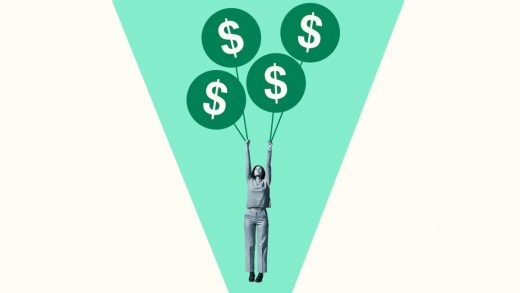The link between mental health and financial literacy for Gen Z
Meanwhile, flip to the financial pages and you’ll see celebrations of the stock market reaching new highs and positive promise of economic growth. So if boom times really do lie ahead, how can we keep women from missing out?
As the president of one of the most prominent women’s colleges in the country, as well as a cognitive scientist and educator, I’ve been paying close attention to how women have been carrying disproportionate burdens of anxiety and stress due to the pandemic. Lately, as I’ve turned my attention to mentoring this year’s graduating class as they search for jobs and enter the working world, I’m struck by the very real relationship between mental health and financial and professional well-being.
Women have reported greater financial anxiety than men since before COVID-19 hit. We still earn less than men doing the same jobs. Pandemic or not, we are likelier to be unpaid caregivers for children and aging or ill loved ones. And of course the United States is the only rich nation in the world that guarantees no paid time for adopting or giving birth to a child, leaving most of us scrambling for a way to cover maternity leave.
But some roots of financial stress start earlier in our lives. As a researcher, my colleagues and I found that girls especially start experiencing anxiety about numbers and math in elementary school. Unchecked, this anxiety around math can lead to avoidance of everyday situations using math, including money management. Amazingly, new research found that even among STEM graduates, women demonstrate less confidence in their abilities than their male counterparts, which in turn contributes to the gender pay gap in these fields.
In fact, about one-third of the financial literacy gap can be boiled down to a lack of confidence among women in their own financial knowledge. Building this confidence can and should start at a young age. Something as simple as parents involving their daughters in counting out dollars and cents or having active discussions around the financial discussions of the day can help girls see the world of finance as something not only boys do.
Likewise, education has an important role to play in arming women with the baseline knowledge needed to not just manage their daily finances, but to be active participants of headline-making financial trends. Women only own roughly one quarter of all brokerage accounts in the U.S. and are even less represented in emerging trends, with only 15% of current cryptocurrency holders identifying as women. Understanding finance and financial markets as drivers of world events should be incorporated into the way schools teach everything from civics to current events.
At Barnard College at Columbia University where I’m president, we are using a two-pronged approach to helping our students master money management. First, we are putting in place programming around topics like how to create budgets, read a paystub, understand one’s financial aid package, calculate percentages that go into a 401k, and assess investment rates of return. Second, we are using behavioral economics to make this programming hard to ignore: We are housing our programs for physical, mental and financial wellness all in a single “well-being center.” For instance, when a student comes to run on the treadmill, they will run smack dab into information about safeguarding their financial health, as well.
As we welcome another wave of freshly minted graduates into this workforce, encouraging young women to take charge of their finances, know their worth, and negotiate pay are all great pieces of advice, but these are late actions to correct a problem that can and should be addressed from a younger age. As we continue to think about innovative ways to improve education in our post pandemic world, we need to start and sustain financial literacy education as a core component to not only the financial well-being of the next generation but their overall wellness too.
Dr. Sian Beilock is a trained cognitive scientist and the president of Barnard College at Columbia University. As one of the most selective academic institutions in the U.S., Barnard is devoted to empowering exceptional women to change the world and the way we think about it.
(13)



